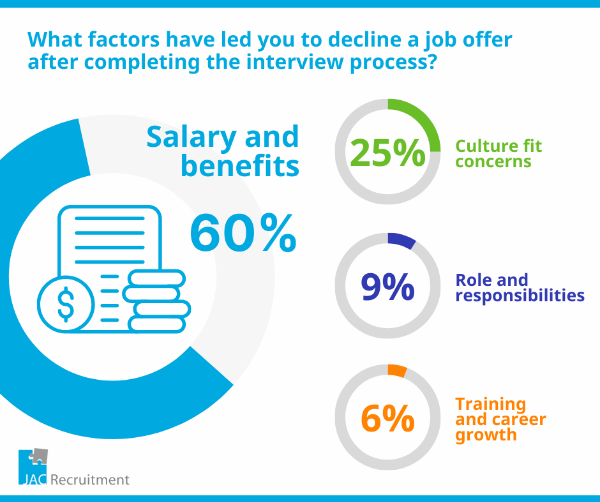The race to recruit talented professionals intensifies as competition in the labour market remains high amid economic uncertainty, shifting work dynamics, and the rise of automation. In Indonesia, a steady economic recovery is fostering a more competitive recruitment landscape, with key sectors like IT, FMCG, logistics, and energy driving increased hiring and further intensifying the competition for top talent.
Amid the tight competition for high-calibre talent, many companies face the challenge of candidates rejecting job offers. For professionals, accepting a job is a pivotal career decision, prompting them to carefully assess not only the benefits and responsibilities offered but also the overall hiring experience. How employers present themselves during this stage can play a key role in shaping a candidate’s final decision.
4 Common Reasons Candidates Reject Job Offers
Understanding the key reasons behind candidates turning down job offers can help businesses refine their recruitment strategies. To gain deeper insight, we surveyed our digital audience, and here are the most common factors contributing to offer rejections.

https://www.linkedin.com/feed/update/urn:li:activity:7231510272891371521/
1. Inadequate Salary and Benefits Packages
One of the most common reasons candidates decline job offers is dissatisfaction with the salary or overall compensation package. Besides salary, professionals also prioritise comprehensive non-monetary benefits. A competitive benefits package can make your offer stand out and help attract top talent; hence, companies should regularly review and enhance their compensation and benefits offerings to meet the evolving expectations of today’s workforce.
In Indonesia, businesses must be particularly mindful of their salary offerings. The recent increase in minimum wages around Jakarta’s industrial areas has put added pressure on companies, compelling many to reassess their compensation strategies to remain competitive.
2. Mismatch with Company Culture
When professionals seek new opportunities, they are not merely looking for a job; they are seeking alignment with a company and its culture. Candidates are increasingly drawn to work environments that support both personal and professional growth. As such, it is crucial for businesses to clearly define and communicate their organisational culture throughout the hiring process. Emphasising a supportive, inclusive, and dynamic workplace can help attract candidates who are a strong cultural fit and enhance their enthusiasm for joining your team.
3. Mismatch Between Role and Responsibilities
A common reason candidates reject job offers is a misalignment between the role’s responsibilities and their expectations. After gaining a deeper understanding of the position during the interview, some candidates may find the workload to be either excessive, insufficient, or not aligned with their long-term career objectives.
Additionally, concerns about inadequate resources, lack of support, or unclear job expectations can lead candidates to reconsider the offer. To avoid this, it’s crucial to ensure that job descriptions are clear and that the responsibilities are well defined before extending an offer.
4. Limited Opportunities for Training and Career Growth
Top-performing candidates are often driven by the prospect of professional development and long-term career growth. If they perceive that a role offers limited potential for advancement, training, or skill development, they are likely to pursue other opportunities.
To attract and retain high-calibre talent, businesses should clearly communicate the career development opportunities available within the organisation. Emphasising pathways for training, skill enhancement, and career progression during the interview process can help appeal to candidates who are committed to growing professionally and contributing to the company's long-term success.
How to Overcome Offer Rejections and Attract Top Talent
1. Streamline the Hiring Process
A prolonged or disorganised hiring process can deter even the most qualified candidates. When you identify the ideal candidate, it’s crucial to act swiftly and extend an offer without delay, particularly if they are likely considering other opportunities. A slow response may result in the candidate accepting an offer from a competitor.
To avoid this, ensure that your recruitment process is streamlined, efficient, and respectful of candidates' time. Provide prompt feedback and maintain clear communication throughout to create a positive and professional experience that reinforces your company’s commitment to attracting top talent.
2. Ensure Transparent Communication Throughout the Interview
The interview stage provides an opportunity for employers to effectively present the company’s culture, benefits, and unique value propositions. Clear and transparent communication is essential to align expectations on both sides, minimising the potential for misunderstandings later in the process. For senior-level positions, it is critical to communicate the full scope of responsibilities, challenges, and opportunities for growth to ensure candidates have a comprehensive understanding of the role.
Read more: Navigating Hiring in Indonesia: A Strategic Approach for Organisations
Rejecting job offers can present a significant challenge for businesses, but understanding the factors that influence candidate decisions allows you to refine your recruitment strategies. By focusing on competitive compensation, a strong company culture, clear role expectations, and opportunities for growth, you can enhance your ability to attract and retain top talent.
If you are facing difficulties in navigating the complexities of recruitment, partnering with experienced recruitment consultants can help streamline your hiring process and connect you with the best candidates in your industry.
Contact us today


